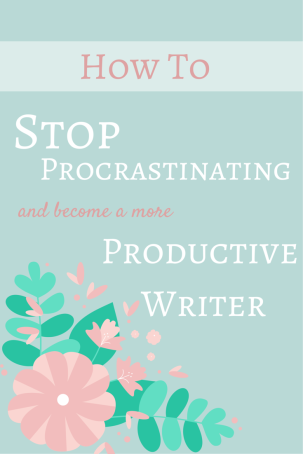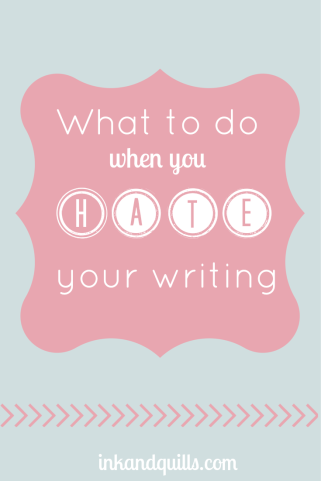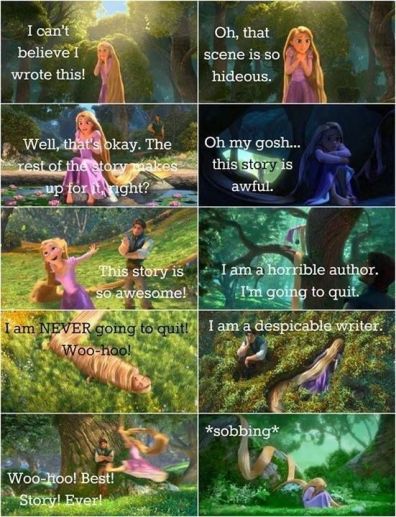 If you’ve come here in search of some quick fix to solve your productivity woes, this is not the blog post for you.
If you’ve come here in search of some quick fix to solve your productivity woes, this is not the blog post for you.
I’m not going to lie to you–writing is a lot of work. And it’s part of human nature to procrastinate and be lazy. Sometimes, no matter how many awesome ideas you come up with, you just don’t feel like writing them.
The trick isn’t eliminating procrastination from the writer–it’s learning how to overcome it. Which will also take work. But if you’re determined to battle and tame the demon of procrastination, read on, brave writer.
Get It All Out
Let yourself have a moment to get out all your procrastination feels. Complain, stomp you foot, groan and roll around on the floor… Whatever you gotta do. Then take a deep breath and drag your butt over to you computer.
Turn off Your Wi-Fi (And Your Phone)
Of course you’ll write on your story…after you check Twitter ten times (hashtag amwriting, hashtag justkidding), browse pics of hot dudes reading on Instagram (for research, of course), and pin pictures of recipes you’ll never make on Pinterest.
The fewer temptations around to distract yourself with, the more you can get done. Switch off the wi-fi on your computer and turn off your phone too for good measure.
Sure it’s easy to turn either back on…but hopefully the mild annoyance will be enough to discourage you. Writers can be lazy creatures, after all 😉
Open the Doc–Just Do It!!!
Half the battle is just opening the Word document with your story. Do it fast. Like ripping off a band aid. Just one little click. DO IT.
Was that so bad?
Of course it was. But you did it.
Develop a Routine
Pick a time where you can sit down and write. It doesn’t matter when, choose a time when you write best. Early morning, afternoon, evening… You don’t have to pick a specific time either, unless that helps.
For me, I tend to write in the evening after dinner, but I don’t carve out a specific time table because I feel it’s too restrictive. Sometimes I may write from 4pm-8pm, 6pm-12am, 5pm-6pm, and everything in-between. Having flexibility is something I need. But I know that evenings are my writing time.
Whether your writing time needs to be more structured or flexible, do whatever works for you. But make sure you pick something and stick to it. You must develop a habit out of repetition.
Set Goals
Know what you want to accomplish, and set a manageable goal for yourself. This can be especially motivating if you’re competitive. Plus, it’s helpful to feel a sense of purpose–that you’re working towards something.
Right now, my overall goal is to finish the first draft of my novel by April so I can enter a Twitter pitch party in June. My daily goal is to write 1,300 words. Whenever I’m feeling unmotivated I remind myself of my goal and it helps me to overcome the writer blahs.
Find an Accountability Partner
Pair up with a friend and tell them your writing goal. Agree to check in with that person every day and tell them your word count so they can keep you accountable. The dread of having to tell someone you didn’t meet your daily goal can be a good boost of motivation to get writing.
Your partner should not just get on you when you’re slacking off, but also encourage you to keep going when you’re having a tough time.
Write in the Morning
There are fewer distractions early in the morning since social media is a dead zone at this time. Writing in the morning can also give you more time in your day if you wake up and get your writing accomplished right off the bat. Try it and see if it works for you.
Write First, Edit Later
Write and don’t look back. Word vomit all over the pages.
Yes, your first draft is going to be awful and it’s hard to resist the temptation to go back and fix things. But remember: you can always polish sloppy pages, but you can’t fix ones that don’t exist.
Don’t interrupt your flow. Accept that your first draft will be crap and power through.
Try Sprints
A writing “sprint” is when you write as much as you can in 30min. Then you take a break (I usually do 10min), and go at it again. Repeat as many times as you can.
I’ve tried this recently and found it works really well for me. I wrote about 1,800 words in a 1 1/2 hour sprint session (so three rounds of 30min). I average 1k an hour, so it wasn’t too shabby!
You can also find sprinting buddies on Twitter and compete to see who can get the highest word count. Friendly competition makes it fun and it’s good motivation! Or, writing fast may not be for you, and that’s fine–there’s no shame in taking your time.
Make a Visual
Make yourself a little poster where you can track your word count and watch yourself get closer to your goal.
Or, buy a bag of your favorite candy and a jar. Every time you write 1,000 words, put a piece of candy in the jar. When you reach your goal, you get the candy. How’s that for motivation? 😉
Bribe Yourself
If all else fails, bribe yourself. Write up a little contract saying you will reward yourself with chocolate, Netflix, a nap–whatever–once you reach X number of words for the day, and sign it.
Silly? Maybe. But when you feel like breaking your deal with yourself, it will serve as a visual reminder. And it will also make you feel like a complete nutter 😀
Sometimes You Can’t–And that’s Okay
While it is good to try to write every day, sometimes you can’t. Stuff comes up. Life happens. Don’t beat yourself up if you miss a day or two. Just get back on the horse!
Hopefully you’ll find something useful here that works for you…and you won’t be too lazy to try it out 😉 Writing is literally a mental battle and hard work. There are no short cuts or magic tricks. If you are serious about writing, you must learn to make it part of your lifestyle.
And stay on guard against procrastination!

How do you overcome procrastination? Do you have any tricks that make you more productive?
Like what you read? Know someone who might enjoy it? Please share it with other writers! Thank you for reading!

 In our modern world we have short attention spans and little patience. We expect everything to be as quick and instant as the click of a button. The same mind-set is often applied to writing.
In our modern world we have short attention spans and little patience. We expect everything to be as quick and instant as the click of a button. The same mind-set is often applied to writing.











 If you don’t use the Oxford comma, we can’t be friends.
If you don’t use the Oxford comma, we can’t be friends.













